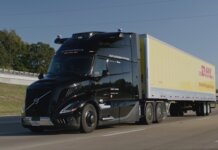TruStar Energy, a company that specializes in renewable natural gas (RNG) fuel supply for the transportation sector, has unveiled plans to continue transitioning heavy-duty U.S. transportation from diesel to lower-cost, cleaner alternatives.
“The future of renewable heavy-duty transportation is here now, thanks to renewable natural gas,” says Adam Comora, president and CEO of TruStar Energy. “Companies operating Class 8 trucks are quickly realizing that they don’t have to wait for new, unproven technologies and infrastructure to significantly reduce their greenhouse gas emissions and save on fuel costs – our RNG does that today. We see RNG as a lasting part of a future where there will be many different fuels and technologies for various applications. We’re excited about the long-term benefits of RNG and look forward to helping more organizations deploy it within their heavy-duty fleet.”
During 2020, TruStar Energy completed 42 natural gas fueling station projects across the country, bringing its total completed projects to 380. TruStar’s service network continues to grow, with over 60 service professionals providing coverage to 140 fueling stations nationwide, producing over 120 million annual GGE.
In December, the company’s parent, Fortistar, in tandem with TruStar Energy’s distribution efforts, announced the fifth of 12 new RNG projects, together requiring nearly $500 million of new capital investment. These new projects will produce over 100 million GGE annually of RNG.
Following years of testing and growing use, RNG has developed into a proven, low-cost, low-carbon fuel. RNG is chemically identical to the natural gas Americans use to cook and heat their homes, with one critical difference: it’s not a fossil fuel pumped from the ground. Instead, RNG is the natural byproduct of landfills and animal waste, captured and processed before it leaks into the atmosphere or is required to be burned off. Fleets that use RNG can reduce their total greenhouse gas emissions by 99% to 149% compared to diesel, and RNG can also cost 40% to 70% less per gallon, providing an attractive rate of return on natural gas truck capital expenditures and significant annual operating cost savings.
Photo: TruStar Energy’s landing page






